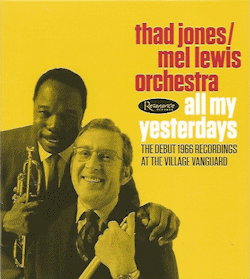CD1
1. Back Bone
2. All My Yesterdays
3. Big Dipper
4. Mornin’ Reverend
5. The Little Pixie
6. Big Dipper (alt. take)
CD2
1. Low Down
2. Lover Man
3. Ah, That’s Freedom
4. Don’ t Ever Leave Me
5. Willow Weep For Me
6. Mean What You Say
7. Once Around
8. Polka Dots and Moonbeams
9. Mornin’ Reverend
10. All My Yesterdays
11. Back Bone
CD1
Thad Jones - Trumpet, flugelhorn, arranger, conductor
Hank Jones – Piano
Sam Herman - Guitar, percussion
Richard Davis – Bass
Mel Lewis – Drums
Jerome Richardson, Jerry Dodgion - Alto sax, clarinet, flute
Joe Farrell - Tenor sax, clarinet, flute
Eddie Daniels - Tenor sax, clarinet
Marv “Doc” Holladay - Baritone sax
Jimmy Nottingham, Snooky Young, Jimmy Owens, Bill Berry - Trumpet
Bob Brookmeyer, Garnett Brown, Cliff Heather, Jack Rains - Trombone
CD 2
Thad Jones - Trumpet, flugelhorn, arranger, conductor
Hank Jones – Piano
Sam Herman - Guitar, percussion
Richard Davis – Bass
Mel Lewis – Drums
Jerome Richardson, Jerry Dodgion - Alto sax, clarinet, flute
Joe Farrell - Tenor sax, clarinet, flute
Eddie Daniels - Tenor sax, clarinet
Pepper Adams - Baritone sax
Jimmy Nottingham, Bill Berry, Jimmy Owens: Danny Stiles – Trumpet
Jack Rains, Garnett Brown, Cliff Heather, Tom McIntosh - Trombone.
Thad Jones was not only a respected trumpeter but also an experienced arranger. If you doubt the latter assertion, just listen to his tune To You
on the album which united the bands of Duke Ellington and Count Basie. Thad’s voicing of the saxes is masterly.
When he was with Count Basie, Jones wrote many arrangements for the Count but some of them were too “modern” in style. So, with help from drummer Mel
Lewis, Thad got together a rehearsal band mainly designed to play his arrangements every Monday. When the band appeared at New York’s Village Vanguard, it
was a great success and became a permanent fixture at the club.
The recordings on this double CD were made at the band’s first two public appearances in February and March 1966 at the Village Vanguard. They portray some
of New York’s top musicians playing together with great enthusiasm and precision. The first track – Back Bone – is typical of the high energy of
the Thad Jones/Mel Lewis Orchestra. It opens with Jerry Dodgion playing unaccompanied. Gradually other musicians join in subtly until an ear-splitting
burst of sound breaks the tentative mood. Various solos are then interspersed with ensemble passages. Bob Brookmeyer and Garnett Brown each solo
unaccompanied (Brown is particularly impressive) until the orchestra bursts in again. I use words like “burst” because there is no doubt that these 18
musicians pull no punches.
Most of the tunes on this first CD are Jones originals, such as the title-track, which provides some calm amidst the storm with a gentle ballad. Mornin’ Reverend appears in two versions on this double album, both featuring Eddie Daniels on tenor sax, where he is less “polite” than on the
more familiar clarinet. Thad Jones gets his first solo on The Little Pixie, bebopping cheerfully but faded out inexplicably after 14 minutes.
Thad wrote all but four of the tunes on the second CD, recorded a month later. On Willow Weep For Me, Thad shares solo duties with trombonist Tom
McIntosh in an arrangement reminiscent of Gil Evans: jumping across bar-lines. McIntosh’s fine solo proves that he is no slouch – not merely a shoe-in to
the trombone section for the March 1966 recording. In Mean What You Say, Jones shares solo duties with his elder brother Hank, alongside Eddie
Daniels, still on tenor. Thad’s last solo appearance is in the final Back Bone. Mel Lewis closes this finale with a discreet drum solo.
Although Bob Brookmeyer was actually Thad Jones’ main collaborator in assembling the orchestra, Mel Lewis was its engine room, just as Thad was its primary
harmonic force. Tom McIntosh said that Brookmeyer called Mel Lewis “the tailor”, because “everything he did, he made it fit”.
The well-packaged discs are accompanied by a 92-page booklet consisting mainly of interviews with surviving members of the band. It also usefully lists the
soloists on each track. The recording quality is very acceptable, despite a few glitches. But I find it distracting to have Thad and others shouting
encouragement loudly during several numbers. It detracts from one’s concentration on the music, which deserves to be listened to closely. 50 years after
these recordings were made, they still sound fresh and lively.
Tony Augarde
www.augardebooks.co.uk
